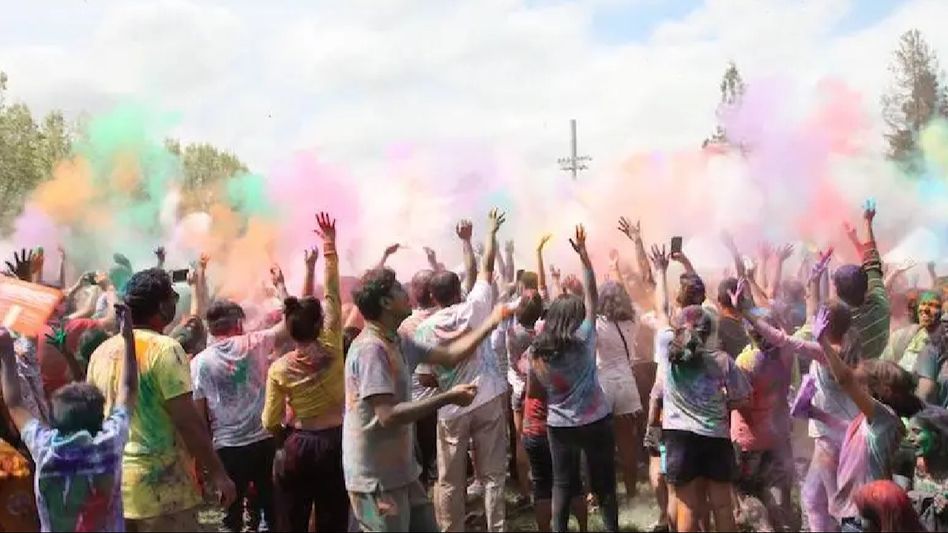Global outreach of India's much loved festival of colours, Holi
Holi, the festival of colors, has transcended its cultural and geographical boundaries in recent times, evolving into a global celebration cherished by people of various backgrounds worldwide.

Holi, the festival of colors, has transcended its cultural and geographical boundaries in recent times, evolving into a global celebration cherished by people of various backgrounds worldwide. Originating in India, this vibrant festival has gained immense popularity beyond the Indian subcontinent, uniting people from diverse cultures in the joyous spirit of camaraderie and festivity. This essay explores the factors contributing to the globalization of Holi, its significance, and the ways in which it has been embraced across the globe.
Historical Context
Holi holds a significant place in Indian mythology and tradition, with roots dating back to ancient Hindu scriptures and folklore. Originally celebrated as a spring festival to mark the victory of good over evil, Holi has evolved into a cultural extravaganza characterized by the playful splashing of colored powders and water. Over the years, its exuberant festivities and vibrant rituals have captured the imagination of people worldwide, leading to its global spread.
Factors Contributing to Globalization:
Several factors have contributed to the globalization of Holi in recent times:
1. Cultural Exchange and Globalization: In an era marked by increased globalization and interconnectedness, cultural practices and traditions are readily shared and adopted across borders. Holi, with its colorful rituals and inclusive spirit, has found resonance among people seeking to embrace diversity and celebrate cultural richness.
2. Migration and Diaspora Communities: The growing diaspora of Indian communities around the world has played a crucial role in popularizing Holi beyond India's borders. As migrants carry their cultural heritage to distant lands, they introduce Holi festivities to their new surroundings, where it often garners interest and participation from the local populace.
3. Tourism and Media Exposure: The proliferation of social media platforms, travel blogs, and documentaries has amplified the visibility of Holi on the global stage. Images and videos capturing the exuberance of Holi celebrations in India have piqued the curiosity of travelers and cultural enthusiasts, inspiring them to experience the festival firsthand or organize similar events in their communities.
4. Cross-Cultural Festivals and Events: Holi-themed events and festivals organized in various parts of the world have contributed to its globalization. From color runs and music festivals to community gatherings and cultural exchanges, these events provide platforms for people of diverse backgrounds to come together and revel in the festive spirit of Holi.
Global Celebration of Holi:
The global celebration of Holi manifests in various forms, reflecting the adaptability and universality of its core themes:
1. Cultural Fusion: In many countries, Holi is celebrated as a symbol of multiculturalism and inclusivity, where people from different cultural backgrounds come together to partake in the festivities. These celebrations often incorporate local customs and traditions, resulting in a unique blend of cultural fusion.
2. Artistic Expression: Holi serves as a muse for artists, musicians, and performers worldwide, inspiring creative interpretations across different art forms. From colorful street art and musical compositions to dance performances and theatrical productions, Holi-themed expressions abound in the global cultural landscape.
3. Social Cohesion: Beyond its aesthetic appeal, Holi fosters social cohesion and community bonding, transcending linguistic, religious, and racial barriers. By promoting harmony and goodwill, Holi celebrations contribute to the fabric of multicultural societies, fostering mutual understanding and respect among diverse communities.
As this vibrant festival continues to transcend its Indian origins and resonate with people worldwide, it serves as a testament to the universal appeal of joy, color, and camaraderie. Embraced as a symbol of inclusivity and cultural richness, Holi has truly become a global phenomenon, enriching lives and spreading happiness across continents.
Copyright©2025 Living Media India Limited. For reprint rights: Syndications Today









